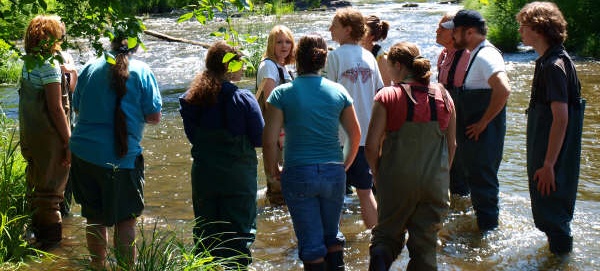
| Science Advisors |
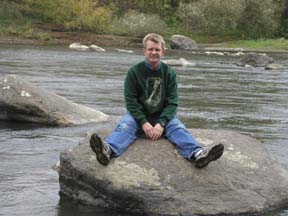
Assistant Professor of Biology - St. Michael's College
|
Declan McCabe is a community ecologist. His primary interest is in the interactions among
aquatic organisms, particularly macroinvertebrates. Research projects include the effects
of disturbance on river insects, facilitative effects of Caddisfly aggregations and impacts
of zebra mussels on soft sediment communities. During the summers he does research in
Vermont rivers, on Lake Champlain, and on the St. Michael's campus. Declan teaches hands-on,
laboratory and field-based courses including Community Ecology and General Biology. He has
recently developed partnerships with three elementary schools where students taking his
Biology in Elementary Schools course teach science lessons to grades 1 through 5. He is
actively involved in all aspects of the streams project, especially those that concern
macroinvertebrates. His student research team has developed site-specific web sites to
facilitate macroinvertebrate identification by the high school teams. He attended
St. Joseph's University (BS), the University of Pittsburgh (MS), and the University of
Vermont (PhD). For more information about Declan's research, go to:
http://personalweb.smcvt.edu/dmccabe/
|
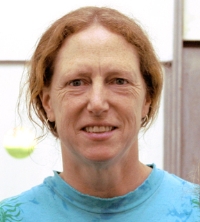
Professor of Biology - Middlebury College
|
Sallie teaches and does research in aquatic ecology and ecological relationships.
Her research focuses on invasive species in oceans, lakes and streams. She has studied
the beneficial properties of the aquatic weevil Euhrychiopsis lecontei, which eats Eurasian
watermilfoil. She has experimentally colonized several Vermont lakes with this weevil to
examine its effectiveness in eliminating milfoil. She also examines how fish use various
habitats, such as aquatic plants, and how human disturbance affects the communities of
animals in streams. Sallie is interested in the factors that influence community structure
as well as mathematical modeling of ecological relationships. She is also actively involved
in all aspects of the Streams Project. She holds a BA degree in Biology from SUNY Buffalo
(1974), a MA degree in Fisheries from SUNY Buffalo (1977), and PhD in Ecology from the
University of Minnesota (1984). For more information about Sallie's research, go to:
www.middlebury.edu/academics/ump/majors/bio/hours/sheldon.htm
|
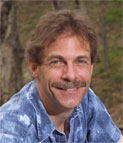
Professor of Biology - Johnson State College
|
Dr. Robert Genter is Professor of Biology at Johnson State College,
Vermont. He received degrees in Atmospheric and Oceanic Science from
The University of Michigan (B.S., 1978), Biology from Bowling Green
State University, Ohio (M.S., 1983), and Botany (Phycology) from
Virginia Polytechnic Institute and State University (Ph.D., 1986).
Ecotoxicology and the response of microorganism communities to
anthropogenic stress (various forms of human impact) is the emphasis of
Dr. Genter's research. Special-interest topics range from the abundance
of freshwater benthic algae under toxic metal stress to microbial
source-tracking of E. coli in freshwater streams. He has authored nine
publications on algal ecotoxicology including a book chapter review.
Dr. Genter's involvement with academics and professional research has
brought him to chair the Department of Environmental and Health Sciences
at Johnson State College (2005-08) and to chair the college's Curriculum
Committee (2003-08). Recently, he served as Vice President of the
Executive Board of the Lake Champlain Research Consortium. Most of all,
Dr. Genter is drawn to all aspects of research including hands-on field
work. He enjoys sharing the relationship between our outdoor
environment and the lab indoors. He has taken students on numerous
local and long-distance learning experiences through Yellowstone
National Park, the Florida Everglades, and the rocky marine shores of
Maine.
|
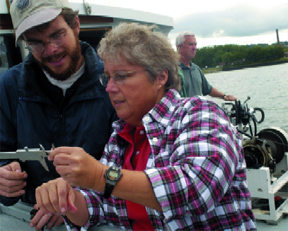
Professor - University of Vermont Rubenstein School of Environment and Natural Resources
|
Mary specializes in Aquatic Ecology and Ecotoxicology. She is very active in many of the
research and education initiatives taking place throughout the Lake Champlain basin. Her
research spans lakes, rivers, and estuaries and is focused on understanding how human
activities, especially polluting the water and altering the landscape, influences the
invertebrates, fish, and birds that live in around the water. Although much of her work
is now concentrated on Lake Champlain and its surrounding watershed, Mary has also worked
in the south Atlantic, the Gulf of Mexico, and in several lakes in Macedonia, Albania, and
southeastern Europe. She teaches courses in a variety of areas, including Ecosystem
Management, Marine Ecology, Restoration Ecology and Large Lake Ecology. Mary has offered
her expertise of Lake Champlain watershed to the Streams Project. She holds a BS degree
in Marine Sciences from the University of South Carolina (1978) and a PhD in Marine Science
from the University of North Carolina at Chapel Hill (1984). For more information about
Mary's research, go to:
http://www.uvm.edu/envnr/?Page=mwatzin/default.html
|
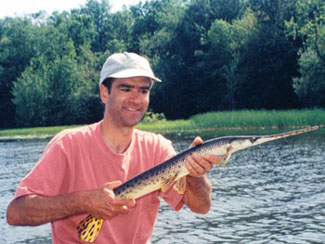
Environmental Scientist - Vermont Department of Environmental Conservation
|
Eric works in the Water Quality Division at the Vermont ANR, primarily on Lake Champlain issues.
He attended Bates College (BS in biology, 1976) and the University of Minnesota (MS in
ecology and limnology, 1980). Phosphorus management on Lake Champlain has been Eric's
major area of focus since the 1980s. His work on Lake Champlain has involved discharge
impact studies, development of phosphorus water quality standards, phosphorus budget and
lake modeling studies, intergovernmental phosphorus reduction agreements between Vermont,
New York, and Quebec, the Lake Champlain Phosphorus Total Maximum Daily Load (TMDL)
document, and Vermont's Clean and Clear Action Plan. Eric works closely with the Lake
Champlain Basin Program, and is a member of its Technical Advisory Committee. He is also
the Vermont program manager for the Long-Term Water Quality and Biological Monitoring
Program for Lake Champlain. For more information, please see:
Eric Smeltzer's UVM homepage.
|
|
|
|




